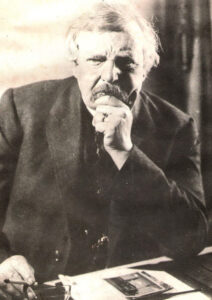
My introduction to a forthcoming new English edition of Chesterton’s ORTHODOXY in Brazil:
There are many good reasons for reading Chesterton, but they can be quite different, even divergent. Some may love detective stories and find the Father Brown tales especially engaging, enlivened by Brown’s experience in the confessional and access to otherwise unavailable schemes of the sinful mind. Others may go to Chesterton for literary criticism, and find his studies of Dickens, Chaucer and Browning among the most discerning ever written. For lovers of autobiographies, Chesterton’s is voluminous, entertaining and reveals one of the most colorful “characters” of 20th century Britain (although he ends up writing much more about other matters than about himself!). Likewise, his numerous novels are not without their enthusiasts.
Christian apologists will go to the man for arguments in defense of their oft beleaguered faith. Still others will be intrigued by Chesterton’s social and economic project of “distributism,” and enlist his writings to formulate alternatives to the reigning projects of socialism and capitalism. Even fans of travel writing might look Chesterton up, since those who have already toured the world will often be surprised by what he uncovers in his books on Ireland, Rome, Jerusalem and America. And then there are the essays, hundreds of essays – on anything and everything that might have caught the man’s attention in over 30 years of writing columns for newspapers and chapters for books.
Yes, there are many reasons for reading Chesterton. But there is one reason for reading the present book that is not adequately addressed by any of the above approaches. A man once wrote me that he had directed a Chesterton reading group for some time and was puzzled at how rarely Orthodoxy got mentioned as a favorite text. Quite a few, who love the fiction, the humor, the apologetics, the social commentary, even the poetry (yes, he composed a large volume of poems!) will find themselves lost after a few pages into Orthodoxy.
They still might use the book to fish out memorable quotes, find confirmations of their Christian faith, or just a handful of expressions to laugh over. Some Chestertonians love nothing more than to compete in finding memorable and comical quotes in the man’s opus. But to truly understand this particular book, you need a very particular reason for reading it – one that is neither literary nor economic, in search of neither biography nor fiction, nor even apologetics. If you are to get to the bottom of this book, you need to open its pages in search of philosophy.
Here Chesterton is philosophizing, and on a very high level. If his words also offer support to Christian belief, it is only because he has first addressed philosophical principles and given them powerful epiphanies – revelations of the natural order that even supernatural disclosures must presuppose. I first read the book 50 years ago and have spent most of the following years studying and teaching philosophy, in no small way because of this book. I wrote my own first book as a kind of guide to Orthodoxy, hoping to help readers find their way into this most brilliant and fundamental of all Chesterton’s works.
We must first understand that the Greek word we transliterate as “orthodoxy” simply means seeing things in the correct way. The title was chosen by its author no doubt because it documents how he first gained philosophical conviction of the theoretical and moral principles that inspire the rest of his writing, of whatever genre.
A different, more easily accessible book might serve as a propaedeutic to grasping the philosophical bearings that underlie Orthodoxy. I refer to another of Chesterton’s masterpieces: St. Thomas Aquinas: the Dumb Ox. Understanding the Angelic Doctor is anything but easy, but this book presents, in a simple and straightforward way, the basic spirit of mind Thomas shared with Chesterton. Reading it first may be the best preparation for Orthodoxy. But in whatever way the present book is approached, it is one that everyone should aspire to read and understand. Few other texts can cure us so well of confused ideologies and misbegotten worldviews. And it does so by allowing us to revisit, on a bracing intellectual voyage, both the wide-eyed vision of the world we once possessed as small children, and the sense of wonder that, in a saner world, we never would have lost.


